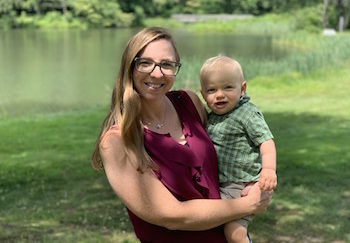
When Heather and Garey Wicks discovered they were having twins, their family treated them like celebrities. “Family we hadn’t talked to in years were sending us gifts because twins are so unique for us,” says Heather. “There’s no record of anyone having twins on either side of our family.”
Not long after their sons Alex and Sammy were born, however, Sammy became known for something other than his twin status. At just over one month old and weighing only six pounds, he was the smallest patient ever to undergo a rare and complex heart surgery — a mitral valve replacement using a Melody™ valve, a type of replacement pulmonary heart valve typically used in adults.
Diagnosis: Congenital Heart Valve Disease
Heather and Garey had a feeling something wasn’t quite right from the very beginning. Doctors in their hometown of Lynchburg assured them Sammy’s jaundice was common in newborns, and they dismissed his rapid breathing after lung tests came back normal. But at the twins’ one-month check-up, their pediatrician discovered Sammy also had a heart murmur.
“The pediatrician told us it was probably just a hole in the heart, which is common, but he wanted us to go see a cardiologist,” says Heather. The next available cardiology appointment was two weeks out, but Heather convinced the doctor to see her son sooner.
An echocardiogram (an ultrasound of the heart) confirmed that Sammy had more than just a hole in the heart. “The cardiologist told us that there was a problem with the mitral valve, but they couldn’t tell how serious it was. They said they would have to send us to the experts at UVA,” says Heather.
Two days later, UVA pediatric cardiologist Daniel Schneider, MD, confirmed their worst fears: Sammy required open-heart surgery in order to survive. “They told us they would have to do exploratory surgery to figure out exactly what was wrong, but they knew his mitral valve wasn’t working,” says Heather. “It was a surreal moment. We have this tiny baby and they’re telling us we could maybe lose him. I could hear them telling us these things, but it was hard to accept that it was really happening.”
Tailored Treatment: A Mini Melody Valve
Pediatric heart surgeons Mark Roeser, MD, and James Gangemi, MD, partnered with pediatric interventional cardiologist Michael Hainstock, MD, to determine the best treatment for Sammy. They made their final decision only after consulting with other pediatric cardiologists across the country by videoconference. “The fact that they consulted with a lot of other doctors trying to find the best, safest solution gave me a lot of confidence,” says Heather.
Sammy’s heart problem was unique and required a unique solution. The UVA team chose to replace Sammy’s faulty mitral valve with the Melody valve, which is designed to replace the pulmonary valve in adults. Retrofitting the valve for such a small patient required some modifications. But the UVA team knew that once in place, the valve would offer the best outcome.
According to Roeser, the Melody valve offers a number of advantages over other potential treatments. “There are very few options available for treating newborn infants with irreparable mitral valves,” he says. “Traditional valves are too large, and the use of mechanical mitral valves is limited by the side effects of anticoagulants [blood thinners] on immature livers.”
“We were able to modify the Melody valve to fit even the smallest child. As the patient grows, the valve can be upsized with a balloon and ‘grow’ with the child,” Roeser adds. “It also provides superior blood flow compared to a traditional valve, with no anticoagulation needed.”
Worth the Risk: Open-Heart Surgery and a Lengthy Recovery
Heather and Garey traveled to Charlottesville the day before the surgery with both of their twins, leaving their four-year-old son, Spenser, at home with family. Although they were confident in the UVA surgical team, the day of the procedure was “the worst day of their entire lives,” says Heather. It was a very risky, all-day procedure, and they had another baby to care for. They couldn’t allow their fears to get the better of them.
“Alex was a good distraction for us,” she says. “He gave us moments of joy. It would’ve been so easy to sink, but he kept us afloat.”
After hours of waiting and wondering, the Wicks finally got the word that Sammy’s surgery was a success. “Around 5:30 in the afternoon, we saw Dr. Gangemi walking toward us, smiling. He looked so happy, which lifted our spirits,” says Heather. “This was the first time he’d done the procedure, so it was a really big deal for him, too.”
The procedure had gone according to plan, but Sammy’s recovery was challenging. He developed supraventricular tachycardia, an abnormally rapid heart rhythm, which was limiting his heart function. It took three-and-a-half weeks and many different drug combinations to stabilize Sammy’s heart rhythm, but he was finally able to go home.
Congenital Conditions During Pregnancy
With modern technology, doctors can offer high-risk mothers 3-D fetal echo ultrasound.
“We have to see our cardiologist every two months, and he is in touch with UVA doctors constantly. They are working together to determine when Sammy will have to have another procedure,” says Heather. “The valve has to be inflated as he grows. This is something Sammy is going to have to deal with his whole life.”
But because of this novel procedure, Sammy is now a typical, playful one-year-old. He is walking, gets into everything and loves roughhousing with his brothers. “After he left the hospital, he was smaller than Alex,” says Heather. “But now he’s caught up. He’s the bigger twin.”


Just happened to stumble across your sons journey. My son was 6 months old and 11 pounds when they had to replace his mitral valve with the melody valve. This was 2 years ago, he was the 2nd baby that had that procedure done at our hospital and since his surgery the hospital has performed over 100 to save these precious babies. So glad to read about your baby. Helps to hear others journeys as well.
Hello, I am currently researching mitral valve replacement using the melody valve. I find these stories unique because my son has an unique issue as well.
My question is what was the size of your child’s mitral valve at the time of replacement?
Mr. Milian – You can find a more in-depth case study highlighting this family’s care at UVA at the link below. Note that this piece was written for physicians and it includes a video, so it is a graphic depiction of the surgery.
https://www.uvaphysicianresource.com/case-study-mitral-valve-replacement/
According to a quote from Dr. Roeser in this article, the annular size was less than 15 millimeters. Please feel free to reach out if you’d like additional information.
Thank you!
Holly Ford (Editor, UVA Physician Resource)